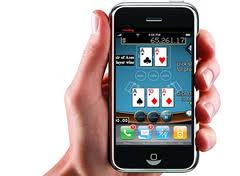In part 2 of our complete Poker Training Course, we'll be discussing the effects of player position and all of the maneuvers one can expect to see, and use, from specific positions.
Early Position
Early position is considered the worst place to be. You have little or no information at the start of a hand to base decisions on. Under the gun, you have read nothing aside from visible poker tells, and there won't be any of those to react on in an online poker setting.
From early position, you need a much stronger hand to even bother making an investment into the pot. Unless you have significant holdings, just fold and save your chips. Ask yourself, "If I make this bet and I get raised, will I call or fold?" If the answer is fold, just go ahead and fold now, because you are likely to get raised from late position anyway. Do NOT make a small bet thinking "at least I won't lose much if I get raised", because the smaller you bet, the higher the risk of getting raised. It's a double-edge sword.
So what moves can you make from early position? Just one, really… You never want to limp in, or make a minimal raise of the big blind. But you can make a big raise and try to take down the pot. You MUST have a strong hand to pull this off. It's not that you are very likely to get called; it's that if you DO get called, you could be in big trouble, and here's why.
An early position bettor knows they must have a stronger hand to play than a late position bettor. Therefore an early position bettor who makes a big move must have a very good hand. Knowing this, the late position bettor also knows that he/she must have an incredibly good hand to make the call. Thus, if you get called, your opponent has a VERY strong hand. Beware!
Middle Position
Middle position is a tricky place to be. A lot of poker players assume it should played with a median response comparable to an early and late position poker strategy. However, mixing the aggression of a late position bettor with the tight, conservative nature of an early position bettor, doesn't always fit the scenario.
Instead, think of it this way. If every player who acts before you folds, you are now the early position bettor. You must react like an early position bettor since there are still late positions waiting to act behind you, and nothing relevant has occurred before you. If this happens, refer to the above section on Early Position poker strategy.
If, however, one or two early position bettors have made a move, you can actually take advantage of late position bettors. Remember there are still others to act after you, though, so don't get too carried away. In the section below on Late Position poker strategy, you'll find that making a move in late position is not such a good idea when too many players are already invested from early and middle position. Cut off the late position bettors when you have decent holdings by either calling a sizable bet from those in early position, or raising a mediocre bet.
This lets the late position bettors know you mean to play this hand, and that stealing the pot is not going to be an option for them. If the late position bettors fold, you take on the presence of late position and may very well get the fold all around, stealing the pot for yourself without need a flop.
Late Position
This is obviously the best place to be as you have complete control of all information. You've gotten to see every player act. From the dealer button, you have nothing invested in the pot, with only the blind bettors behind you.
As a blind bettor, you are still in late position, but at the mercy of the button position. This player is able to take all information proffered and react accordingly.
When on the button, you have the chance to steal blind bets. Blinds alone may not seem like much, but consider that stealing one round of blinds will pay for one entire circle of betting around the table, allowing you to maintain a very tight poker strategy without your stack dwindling.
To attempt stealing the blinds from late position, you need the stage to be set in a fairly specific manner. At a full ring game (9 to 10 players), there should be no more than 2 players in the pot (minus blind bettors) pre-flop. If none of these players have made a decent raise (nothing over 2x the big blind), or if they've merely limped in (calling the big blind), it's the perfect opportunity to steal the blinds. All you have to do is make a raise of 3x or more of the current pot size. Unless someone is holding a monster hand, everyone insta-folds and the pot is yours.
Being in late position opens you to a much larger range of hands. Instead of requiring pocket Kings or Aces, or A-K suited, as early position bettors would need, you can feel confident playing a hand like pocket 9's, middle suited connectors or off-suit face cards, so long as it doesn't require a massive investment. Since you already know what you'll be risking to call, you control the pot size when deciding to call or raise.
Don't let a late position opportunity pass you by, but don't take a heavy risk just because you're in late position either. It's not the end of the world to fold on the button. It will come back around eventually. Play smart and heed all warning signs before you make any moves.



